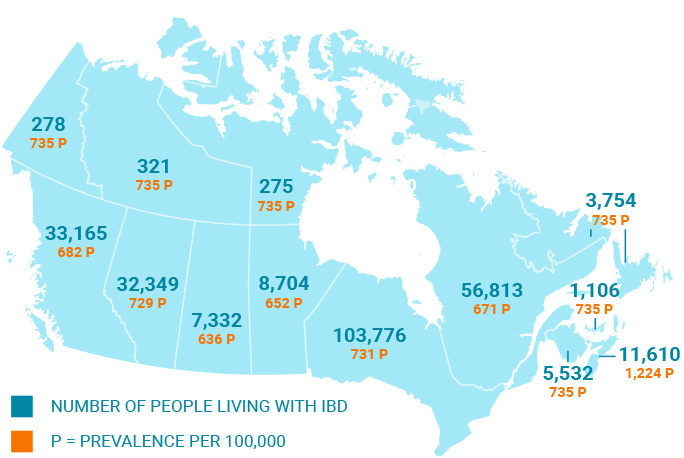It’s no secret that Canada has one of the highest rates of inflammatory bowel disease in the world. While that fact in itself has much meaning, what’s imperative is knowing just how Crohn’s disease and ulcerative colitis affect individuals, and the country as a whole.
The 2018 Impact of Inflammatory Bowel Disease in Canada report is the first wide-ranging examination of the disease and its impact on Canada since 2012. In the six years that elapsed between reports, researchers have uncovered new findings about the disease, about the people who are living with it, and how Canada can take strides to better care for those affected. Those discoveries are presented in the updated 2018 report, which serves as a comprehensive, data-laden resource about the impact Crohn’s disease and ulcerative colitis have across the country.
In this article below we provide highlights and key insights from the report. This is a report from the scientific community to Crohn’s and Colitis Canada.
Incidence and prevalence of IBD in Canada

Key Findings from the 2018 Impact of IBD in Canada Report
-
270,000 Canadians are living with inflammatory bowel disease (IBD)
-
By 2030, the number of Canadians with IBD is expected to rise to 400,000 (approximately 1% of the population)
-
Seniors (aged 65 and over) with Crohn’s or colitis are the fastest growing group of Canadians with IBD, and our healthcare system must be prepared to face this challenge.
-
Seniors with Crohn’s or colitis face complications of longer disease duration,and caring for age-related simultaneous conditions such as diabetes and cardiovascular disease.
-
Canadians with Crohn’s or colitis in rural areas are less likely to receive gastroenterologist care, which has consequences on long-term outcomes.
-
Crohn’s and colitis impact Canadians of all ethnicities and religions, but the rate of new diagnoses is higher among Ashkenazi Jewish and South Asian people.
-
There are over 7,000 Canadian children (under age 18) living with Crohn’s or colitis.
-
The prevalence of Crohn’s and colitis in Canadian children has risen more than 50% in the last 10 years.
- Children with Crohn’s or colitis have different disease complications, respond differently to treatments, and are at a greater risk of side effects of medication as compared to adults.
"The findings within the report should serve as a wake-up call for the Canadian health care system," said the report's co-chair and author, Dr. Gilaad Kaplan, a gastroenterologist at the University of Calgary. "One key takeaway from the report is that Canada is not ready to face the rising number of seniors, children, immigrants, and other high-risk populations who are developing these incurable and potentially devastating diseases."
Looking Forward and Recommendations
The total direct annual cost of caring for people with IBD in 2018 is estimated at $1.28 billion, and that cost is expected to rise as more Canadians are diagnosed, and as the full impact of these diseases are better understood.
"People diagnosed with Crohn's or colitis live with a serious disease that causes issues both inside and outside the digestive system, and that can take a toll on someone's mental health", said the report's co-chair and author, Dr. Eric Benchimol, a pediatric gastroenterologist at the Children's Hospital of Eastern Ontario. "Crohn's and colitis affect all aspects of quality of life and that multi-faceted impact emphasizes the need for multidisciplinary care and understandably adds to the overall financial weight of caring for IBD," adds Benchimol.
The authors of the report have provided the following recommendations that will inform Crohn's and Colitis Canada's perspectives and positions:
-
Increase funding for research into preventing and treating IBD and to address the physical, psychological, and social issues caused by IBD.
-
Introduce greater public and private investment in IBD research and commercialization strategies so as to expedite translation of academic-based research discoveries into clinical applications in humans.
-
Improve recognition and funding for research intospecial populations of people with IBD, including children, seniors, and pregnant women.
-
Recognize IBD is a national health priority and increased resource allocation for chronic care models that reflect the episodic nature of IBD to optimize healthcare delivery to this population. This is the responsibility of the federal government.
-
Enact a national public health campaign and patient education programs to raise awareness and knowledge among the general public and healthcare professionals in order to facilitate earlier diagnosis and reduce social stigma associated with IBD; leadership for such a campaign could come from Crohn’s and Colitis Canada.
-
Introduce public and private sector programs (including laws) that foster open access to washroom facilities for people with IBD or incontinence.
-
Ensure timely and appropriate access to gastrointestinal specialists, allied healthcare professionals, endoscopy, and radiology services for those who are waiting for diagnosis or treatment of IBD, particularly in rural and underserviced areas.
-
Enhance and harmonize public and private drug plans so that patients with IBD—no matter where they live in Canada, their age or their socio-economic status—have equal and better access to medically-prescribed pharmaceuticals that improve a patient’s health and quality of life.
-
Improve drug review processes reflecting the latest research and best practices so that therapies of benefit to people with IBD are approved and available more quickly.
- Introduce appropriate income security measures and employee assistance programs that offer support for chronic disease patients.
"Canada needs to be prepared for the growing social and economic impact of Crohn's and colitis," said Mina Mawani, President and CEO of Crohn's and Colitis Canada. "These diseases place a tremendous burden on individuals, on families, and on our healthcare system. The rising rates of Crohn's and colitis underscore the need to fund more research and improve access to specialized care."
Last updated: November 1, 2018